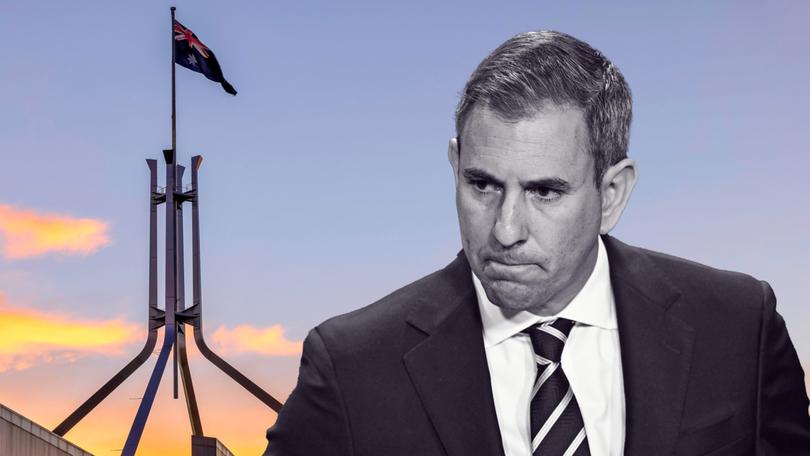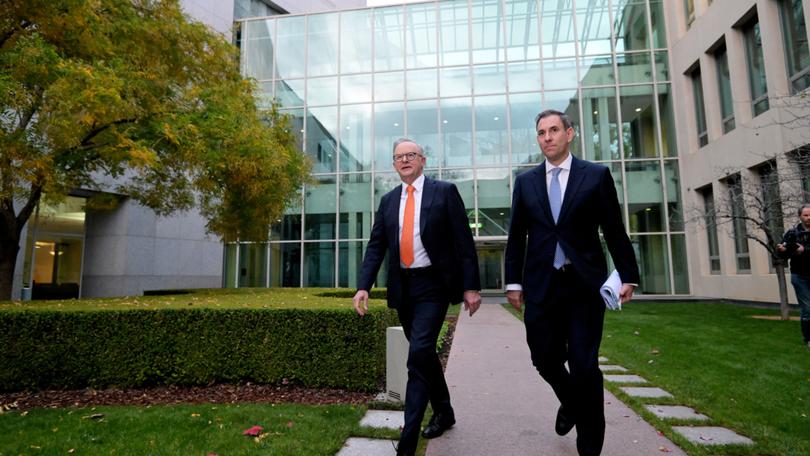Economy showdown: Treasurer Jim Chalmers set to give ‘substantial’ statement on Australia’s finances
Treasurer Jim Chalmers is set to give a ‘substantial’ statement on the state of the nation’s finances this week, as a showdown over the economy looms over the final parliamentary sitting of the year.

Treasurer Jim Chalmers is set to give a “substantial” statement on the state of the nation’s finances on Wednesday as a showdown over the economy looms over the final parliamentary sitting of the year.
Dr Chalmers’ statement — the first of its kind since September 2022 — is expected to contain forecasts that will set the tone for the Albanese government’s financial pledges to voters ahead of the federal election next year.
The statement is likely to give an early nod towards the direction of Labor’s future economic promises, particularly as ongoing uncertainty about the date of the poll means the Federal Budget may not go ahead as scheduled.
Sign up to The Nightly's newsletters.
Get the first look at the digital newspaper, curated daily stories and breaking headlines delivered to your inbox.
By continuing you agree to our Terms and Privacy Policy.Speaking to the media in Canberra on Monday, Dr Chalmers said his address would focus on “the progress Australians have made together when it comes to getting inflation down and wages up,” as well as “rolling out the cost-of-living help at the same time as we reform our economy for the future”.
The Albanese government faces a daunting logjam of legislative proposals to push through what could be the last sitting of parliament before voters head to the polls.
November’s two-week sitting could make or break Labor’s legacy on a raft of signature policies from international student caps, misinformation laws, housing reform, aged care, pay rises for early education workers and controversial caps on political donations and campaign spending.

The parliamentary agenda remains fluid as Labor carefully chooses its battles to focus on potential wins.
It still faces the prospect of having to abandon key policy pledges that it will be unable to pass through a hostile Senate.
One casualty could be Labor’s two key housing bills, which lie at the heart of its attempts to tackle the cost-of-living crisis.
The fate of the government’s Help to Buy shared equity scheme and new tax measures to encourage more build-to-rent properties hangs in the hands of the Greens who are currently holding out for a government commitment to provide more social housing support.
Over the past week, the Greens have signalled they will drop previous demands to limit rent increases and wind back tax breaks for property investors such as negative gearing, in exchange for the provision of more homes through the Housing Australia Future Fund (HAFF).
The fresh approach has so far gained little traction with the government, who have accused the Greens of teaming up with the Coalition to play politics.
Dr Chalmers could barely conceal his frustration at the possible thwarting of the government’s investment plan for housing in the final months of the current administration.
“We don’t have a majority in the Senate so we play the cards we are dealt and try and do the best we can to pass as much of our agenda as we can,” he said.
But he added: “I say to the Greens, if you want more investment in housing you have got to vote for it.
“Stop teaming up with the Liberals and the Nationals to prevent more investment in housing or more rental properties being built or to prevent it getting easier for people to get a toe-hold in the housing market.”
But it’s a fierce confrontation between Labor and the Coalition over who can be trusted most with the nation’s economy that threatens to dominate parliament’s proceedings in the first half of this week, with both sides launching early salvos early Monday morning.
Dr Chalmers fired the starting gun in what is shaping up to be a week of election posturing by downplaying the prospect of an income tax cut or a government “spend-a-thon” in the coming months.
The government is keen to stave off opposition accusations that “unnecessary” spending is responsible for inflation and the Reserve Bank’s hesitancy to lower interest rates.
“If there is a defining feature of our economic management, it’s responsibility and people shouldn’t anticipate the mid-year update or the budget to be some kind of free for all of public spending,” Dr Chalmers said, while also conceding there would be “inevitably new measures that we tally in in the mid-year budget updates.”
Taking a swipe at the Coalition, he said they had failed to come clean any “costed or credible or coherent policies” on the economy and accused opposition leader Peter Dutton of “angry and risky recklessness” that put households at risk.
“They have opposed our cost-of-living help. They won’t tell us what they will do with the tax cuts . . . we know that they hate wage increases. So ordinary Australians will go backwards in tangible ways if we hand the keys to Peter Dutton and Angus Taylor.”
In a sign of fiery debates to come this week and of the Coalition’s own election strategy, Mr Dutton hit back at the treasurer’s economic blueprint, calling his Monday morning announcement on mandating businesses to accept cash a “thought bubble” and “distraction”.
“The treasurer, frankly, should be spending his time on working on how to bring down inflation,” he told Sky News.
“Families are really struggling under the Albanese government. They just can’t manage the economy, and our country is heading in the wrong direction.”
Drawing a parallel with the US elections, he accused Mr Albanese of making a “deliberate political decision to go with the elites.”
“He’s left behind people who are struggling in the suburbs, that much is obvious, because people are sitting around their kitchen tables now and they can’t pay their bills.”

